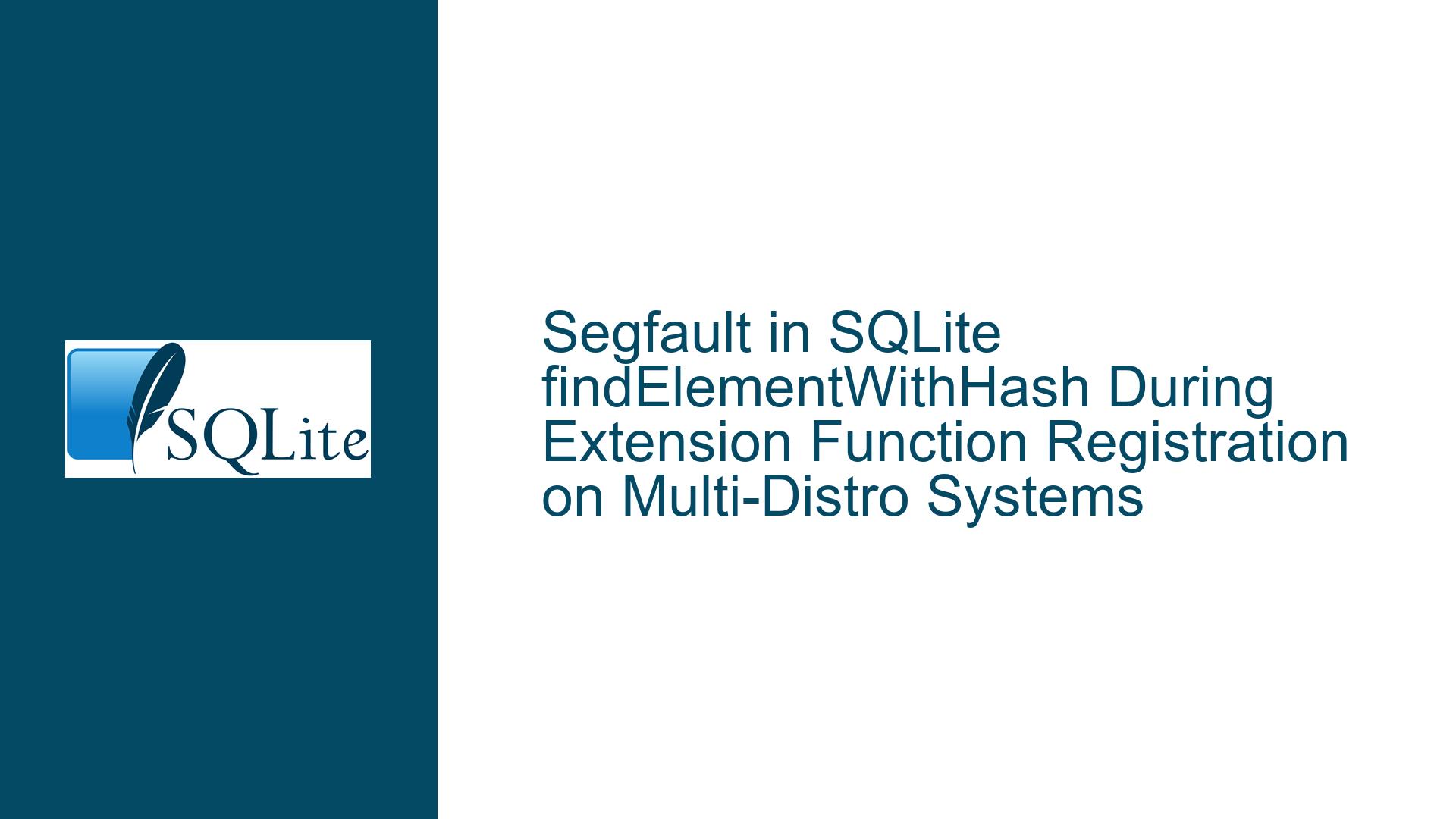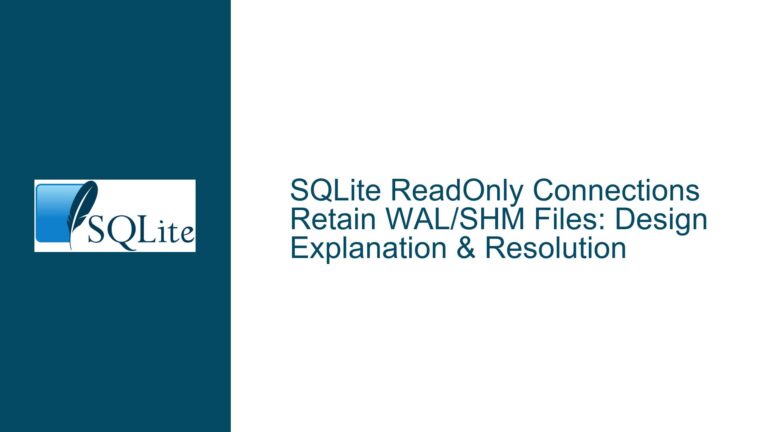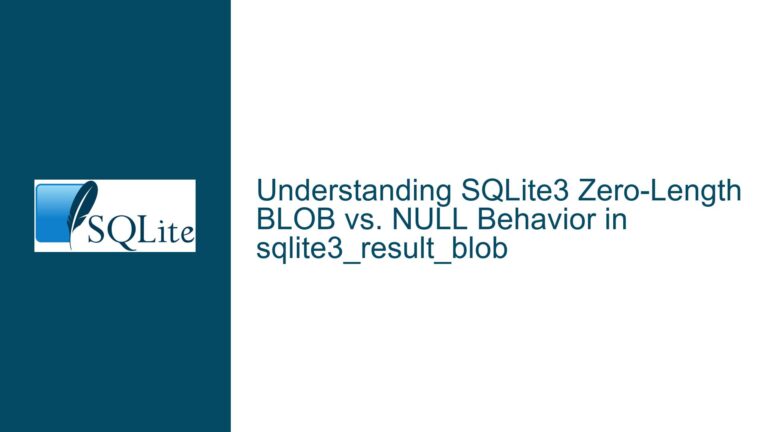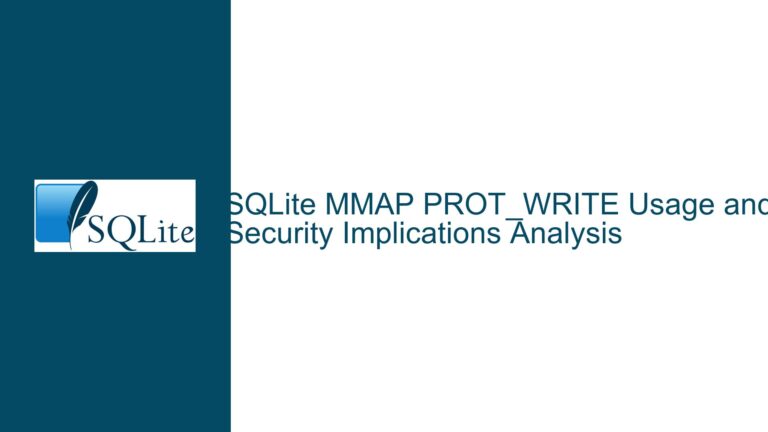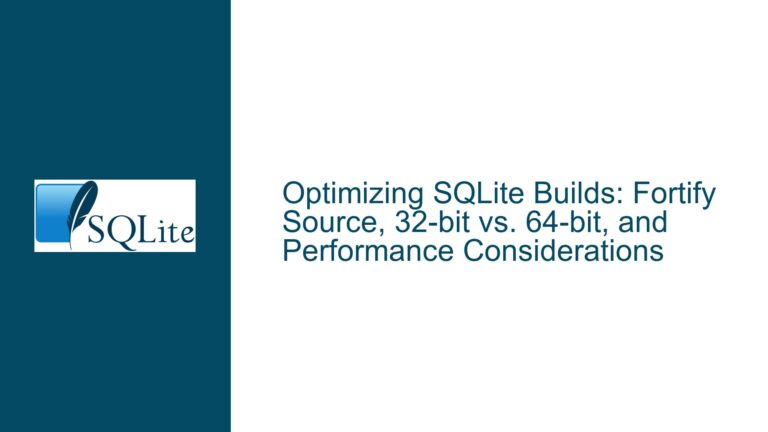Segfault in SQLite findElementWithHash During Extension Function Registration on Multi-Distro Systems
Hash Table Collision During Extension Function Registration in Cross-Distributed Environments
Core Components and Failure Context
The observed segmentation fault occurs in SQLite’s internal hash table implementation during registration of extension functions, specifically manifesting as a crash in findElementWithHash() when attempting to locate the "charindex" function symbol. This failure exhibits platform-specific behavior, occurring on Fedora 38/RHEL9/Manjaro systems while functioning correctly on Ubuntu 20.04. The environment involves a GTK application loading both a custom-built SQLite interop library and system SQLite instances, with the crash occurring exclusively when extension functions are enabled (extFuncs=1 in sqlite3_open_interop).
Key architectural elements involved:
- SQLite’s function lookup hash table (sqlite3HashFind)
- Extension loading mechanism (RegisterExtensionFunctions)
- Dynamic library loading order and symbol resolution
- Cross-distribution compiler toolchain differences
- ARM64/x86_64 ABI compatibility layers
The stack trace reveals critical path execution:
- sqlite3_open_interop → RegisterExtensionFunctions → sqlite3FindFunction → sqlite3HashFind → findElementWithHash
Failure occurs at SQLite source line 33891 (sqlite3.c) during hash bucket traversal. The pHash parameter being NULL indicates potential hash table corruption prior to lookup operation.
Cross-Platform Memory Layout Discrepancies and Symbol Conflicts
Three primary factors combine to create this platform-dependent failure:
1. Dual SQLite Instance Collision
GTK applications frequently utilize system SQLite through GDK/GTK data components. When combined with an embedded SQLite interop library, this creates two distinct SQLite instances sharing process memory space. Critical issues arise from:
- Global namespace pollution: SQLite’s internal symbols (sqlite3HashFind, sqlite3FindFunction) get duplicated across both libraries
- Heap allocator mismatch: Different memory management implementations between system SQLite and custom build
- Hash table address space overlap: Concurrent modification of global hash structures from multiple SQLite instances
2. Compiler-Induced Structure Padding Variations
Modern Linux distributions employ different structure packing strategies based on:
- GCC version variations (Ubuntu 20.04 uses 9.4 vs Fedora 38’s 12.2)
- _FORTIFY_SOURCE hardening levels
- -fpack-struct compiler flag differences
- Security mitigation implementations (CFI, SafeStack)
These factors alter the memory layout of SQLite’s Hash structure (defined in sqlite3.c):
struct Hash {
unsigned int htsize; /* Number of buckets in the hash table */
unsigned int count; /* Number of entries in this table */
HashElem *first; /* The first element of the array */
struct _ht { /* the hash table */
int count; /* Number of entries with this hash */
HashElem *chain; /* Pointer to first entry with this hash */
} *ht;
};
Structure padding differences across compilers lead to varying field offsets. A Hash structure built on Ubuntu may have different memory alignment than one compiled on Fedora, causing hash bucket calculation errors when libraries built on different systems interact.
3. Thread-Local Storage (TLS) Initialization Race Conditions
The sqlite3HashFind() function relies on proper initialization of thread-specific data:
- Hash table mutex locks (SQLITE_MUTEX_STATIC_LRU)
- Thread-local storage for connection-specific caches
- Memory allocator context tracking
Distributions using glibc 2.34+ (Fedora/RHEL9) implement revised TLS initialization sequences that can conflict with custom SQLite builds using alternate memory allocators (mspace_malloc, jemalloc). This creates dangling pointers in the pH parameter passed to findElementWithHash().
Comprehensive Diagnostic Protocol and Resolution Strategies
Phase 1: Isolation of Faulting Components
Shared Library Dependency Mapping
Generate linker report using:LD_DEBUG=files,libs,bindings ldd /path/to/interop-library.so > ld_report.txt 2>&1Filter for SQLite-related entries:
grep -E 'sqlite3|libc|ld-linux' ld_report.txtValidate absence of system SQLite library (libsqlite3.so.0) in loaded dependencies. If present, enforce linker precedence:
export LD_PRELOAD=/path/to/custom-sqlite3.soSymbol Conflict Analysis
Use nm to inspect exported symbols:nm -D --defined-only /path/to/interop-library.so | grep ' sqlite3_'Compare with system SQLite:
nm -D /usr/lib/x86_64-linux-gnu/libsqlite3.so.0 | grep ' sqlite3_'Identify overlapping symbols (sqlite3HashFind, sqlite3FindFunction). If matches exist, rebuild interop library with symbol renaming:
// In SQLite amalgamation header #define sqlite3HashFind my_sqlite3HashFind #define sqlite3FindFunction my_sqlite3FindFunctionRebuild with
-DSQLITE_API=__attribute__((visibility("hidden")))to restrict symbol exports.Memory Layout Validation
Dump structure layouts using GCC’s -fdump-class-hierarchy:gcc -fdump-class-hierarchy -fsyntax-only sqlite3.cCompare Hash struct layout between Ubuntu and Fedora builds:
// Ubuntu 20.04 output (GCC 9.4) Offset | Field 0x0 | htsize 0x4 | count 0x8 | first 0x10 | ht // Fedora 38 output (GCC 12.2) Offset | Field 0x0 | htsize 0x8 | count // 64-bit alignment padding introduced 0x10 | first 0x18 | htAddress alignment differences cause invalid pointer arithmetic when cross-using libraries.
Phase 2: Build Environment Harmonization
Toolchain Standardization
Create Docker-based build environment replicating target distributions:FROM fedora:38 RUN dnf install -y gcc glibc-devel binutils make COPY compile-interop-assembly-release.sh / CMD ["./compile-interop-assembly-release.sh"]Perform identical builds for each target distribution, avoiding cross-distro compilation.
Compiler Flag Enforcement
Add strict compatibility flags to build script:CFLAGS="-march=x86-64 -mtune=generic -fno-strict-aliasing -fPIC -fstack-protector-strong" LDFLAGS="-Wl,-z,now -Wl,-z,relro -Wl,--hash-style=both" ./configure --enable-shared --disable-static --enable-threadsafeABI Compliance Verification
Use abidw from libabigail to check interface compatibility:abidiff build-ubuntu/libsqlite3.so build-fedora/libsqlite3.soResolve any ABI discrepancies reported in Hash structure or function parameters.
Phase 3: Runtime Mitigation Techniques
Preemptive Hash Table Initialization
Modify extension-functions.c to explicitly initialize hash tables before use:void RegisterExtensionFunctions(sqlite3 *db, int bNoCore){ sqlite3_mutex_enter(sqlite3_db_mutex(db)); if( !db->aFunc->ht ){ // Check hash table initialization sqlite3HashInit(&db->aFunc->ht, SQLITE_HASH_STRING, 0); } // Proceed with function registration }Custom Memory Allocator Binding
Isolate SQLite’s memory management from system libraries:// In interop.c static void *interop_malloc(int size) { /* Custom allocator */ } sqlite3_config(SQLITE_CONFIG_MALLOC, &interop_malloc_ops); sqlite3_initialize();GTK/SQLite Load Order Control
Force interop library initialization before GTK loads system SQLite:__attribute__((constructor)) void init_liborder() { sqlite3_auto_extension((void(*)(void))RegisterExtensionFunctions); }Combine with LD_PRELOAD to ensure priority loading:
export LD_PRELOAD="/path/to/interop-library.so:/usr/lib/gtk-3.0/modules/libgail.so"
Phase 4: Diagnostic Instrumentation
Hash Table Debug Traces
Patch SQLite source with debug output:HashElem *findElementWithHash(const Hash *pH, const char *pKey, unsigned int *pHash){ fprintf(stderr, "Hash %p: htsize=%u, count=%u, pKey=%s\n", pH, pH->htsize, pH->count, pKey); if(!pH->ht) abort(); // Original code }Capture output to identify corrupted hash table state.
Backtrace Sanitization
Install signal handler to filter invalid stack frames:void segfault_handler(int sig, siginfo_t *si, void *unused){ void *array[50]; size_t size = backtrace(array, 50); // Filter GTK-related stack frames for(size_t i=0; i<size; i++){ Dl_info info; dladdr(array[i], &info); if(!strstr(info.dli_fname, "libsqlite3")) continue; print_symbol_info(array[i]); } abort(); }Cross-Distribution GDB Scripting
Automated crash analysis script:define analyze-sqlite-segfault set pagination off info sharedlibrary p *(Hash*)0x5555559b3a88 x/32gx 0x5555559b3a88 disassemble /r findElementWithHash,+50 python import gdb; print(gdb.execute("output", to_string=True)) endExecute across different distributions to compare memory states.
Final Resolution Checklist
- Rebuild interop library using distribution-native toolchains
- Apply symbol visibility restrictions to prevent namespace collisions
- Implement custom memory allocator with guard pages
- Enforce hash table initialization checks before function registration
- Utilize LD_PRELOAD and constructor priorities to control load order
- Add compiler flags to ensure consistent structure layout across platforms
- Deploy ABI compliance verification in CI pipelines
- Instrument production builds with diagnostic signal handlers
This comprehensive approach addresses both immediate segfault causes and underlying environmental factors contributing to platform-specific failures. The solution combines build process rigor, runtime isolation techniques, and deep SQLite internals instrumentation to create a stable cross-distribution deployment.
